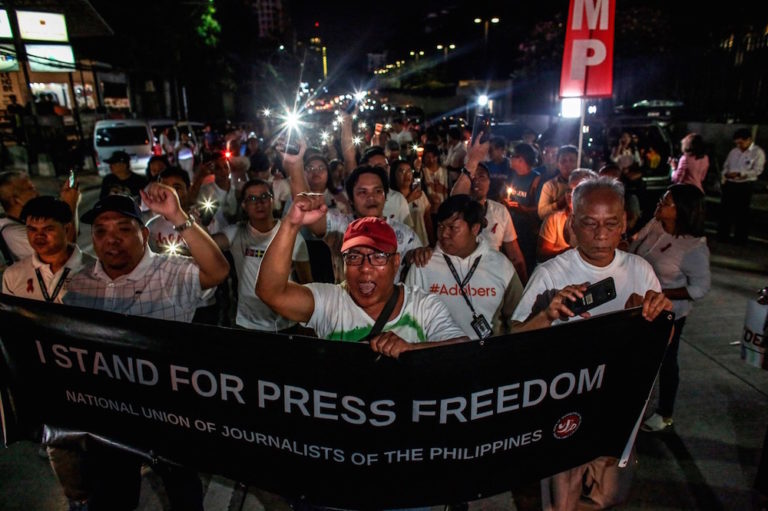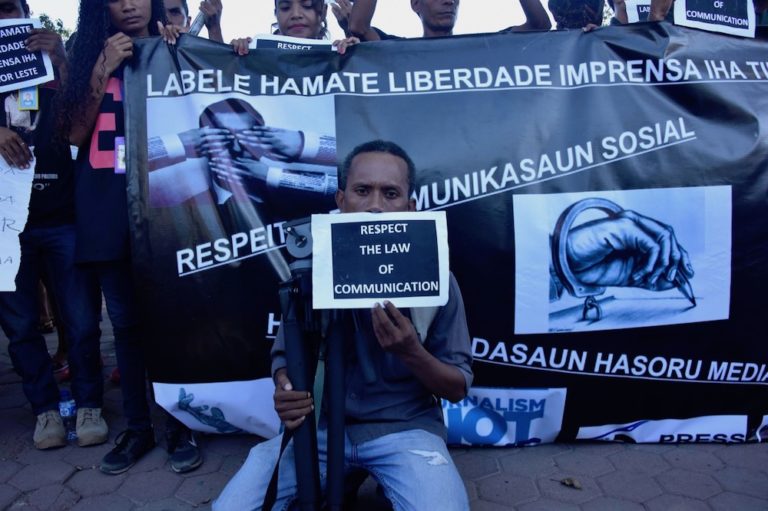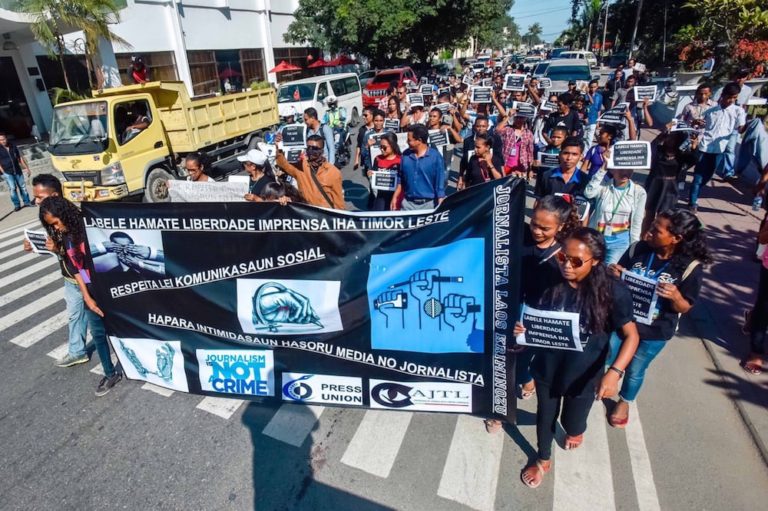Sometimes it's the little things that make for big victories. Such is the case in East Timor, where charges against two journalists were dropped following an international outcry.
This statement was originally published on ifj.org on 1 June 2017.
The International Federation of Journalists (IFJ) joins its affiliates the Timor Leste Press Union (TLPU) and the Timor Leste Journalists Association (TLJA) in welcoming the decision today by the Timor Leste judiciary to dismiss charges against two journalists charged with slanderous denunciation. The IFJ commended the two journalists for their fortitude and determination in bravely fighting the case brought against them by Timor Leste Prime Minister, Rui Maria de Araújo.
“Viva East Timor journalists,” was the summary by Timor Leste Press Union’s former president Jose Belo, who commended the fighting spirit of the country’s media community over the course of a long campaign for justice for the two Timorese journalists.
At 6pm today, June 1, 2017, Dili judge Ivan Patricinio Antoninho dismissed all charges against Oki Raimundos and Lourenco Martins at the Dili Court. The two men were preparing to go to jail after prosecutors last week pushed for a one year jail sentence for Oki and a two-year suspended sentence for Lourenco. The verdict came more than 18 months after an article authored by Oki Raimundos was published in the Timor Post pertaining to Rui Maria de Araújo, in his former role as advisor to the country’s finance minister. The investigative article from 2015 looked at a government tender for IT services which wrongly reported the company Mr Araújo was supporting for the tender. The Post followed up with a right of reply and a correction to the story. However, on January 22, 2016, Mr Araújo filed a case with the public prosecutor under Article 285 (1) of Timor Leste’s Penal Code accusing Oki and the then-editor of the Timor Post of ‘slanderous denunciation’.
The IFJ general secretary, Anthony Bellanger, said: “This is a pivotal victory for press freedom in Timor Leste and reinforcement of national and international solidarity against criminal defamation and an attempt to send journalists to jail for simply doing their jobs.”
Australian barrister and IFJ observer on the case, Jim Nolan, said: “We are delighted with the result and this sets an important precedent that no future press complaint will be sent to the criminal courts but will be handled by the Press Council. The case should never have come to this, but we hope this means it won’t happen again in the future.”
With just 48 hours until the verdict was due to be delivered, Prime Minister Araújo issued a letter to the judiciary saying that the defendants should not be given a prison sentence by the Public Prosecution Service. In the letter, Mr Araújo also noted that he did not have any right to compensation from the case. The verdict comes after a year of international efforts by local journalists unions and the IFJ, the South East Asian Journalist Unions (SEAJU), Committee to Protect Journalists, Freedom House and Australia’s Media, Entertainment and Arts Alliance (MEAA) had made direct representations to the prime minister to drop the case.
The IFJ said: “There is no doubt that the growing international attention on this case helped. Had this gone ahead it would leave a black mark on Timor-Leste and send a message out to authoritarian regimes that it’s ok to lock up journalists.”
The IFJ welcomes further dialogue with the country’s new Press Council and the government in order to strengthen journalism and press freedom in the country.
Anthony Bellanger said: “While we welcome the decision by the Timor Leste judiciary not to jail Oki and Lourenco and the Prime Minister’s efforts this week, we remain gravely concerned that the case got to this point. Timor Leste decriminalised defamation in 2009, and yet here we are in 2017, dealing with this case. The lives of Oki and Lourenco have been deeply impacted by this case. Now we just hope they can get on with their work and doing the important job of keeping the public informed and undertaking their investigations without fear of jail.”
MEAA CEO Paul Murphy said: “This is a tremendous outcome that acknowledges that the journalists in question made an error and corrected the record when they became aware of the mistake. This decision is an important reminder that Timor Leste’s criminal defamation law is a bad law. Any attempt to criminalise public interest journalism is an attack on press freedom. We urge the government to rethink its media law and remove from the statute books any attempt to criminalise and imprison journalists for simply doing their job.”
AJTL said: “AJTL deeply regrets and [expresses] disappointment with the indictment by the Prosecutor General, for not using the Timor-Leste press laws and the journalistic code of conduct; if [a decision had been made to send] journalists Oki and Lorenco to prison, we [would have been able to say that there is] no more press freedom in Timor-Leste and no more democracy in this country. AJTL also asks all leaders in this country to respect press freedom and the media law and also to ask the court to resolve any dispute or problem with journalists by using the press law. AJTL is very happy with this decision, because the judge did not use the Timor-Leste penal code to condemn the journalists, but instead used the press law and the journalistic code of conduct to solve this case.”
In the lead up to the verdict, Oki had said, “Im not a corruptor, I’m not a criminal.” Then outside the court he said: “I am extremely happy with this outcome, and will ensure that all my future work is very accurate and I will double all my fact-checking efforts. Thanks for your support.”



